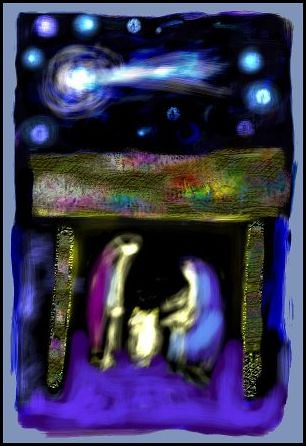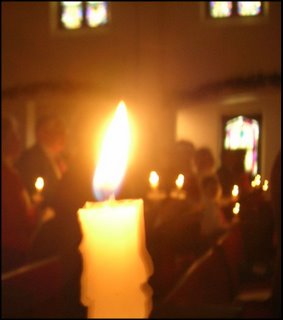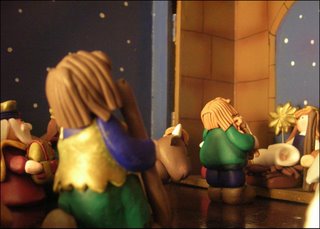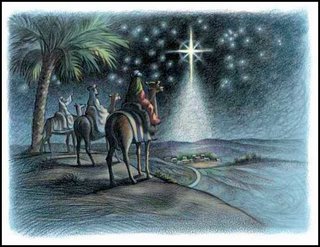This is a cross post from our JM Advent blog, but I like to keep the poems all in one place, so I'm posting it here, too.Luke 2:1-7
The bed wasn’t that comfortable,

But it was HIS bed.
He lay in it
Awake.
Listening to the snoring,
The kicking and shifting,
The sounds of men trying to sleep.
He lay in it,
Grateful to be curled around his wife,
His hand resting on her slightly swollen belly,
Covering the child inside.
Some would call his house an inn.
He called it his home,
Nightly he opened the door
To allow strangers access,
To sleep on the floor of the next room.
Warmth away from the cold.
Just now, lately
As Caesar counted heads,
His home was more crowded than usual.
It smelled worse than usual.
The sounds were more offensive that usual,
But his pocket was a little more full than usual.
As he shifted and tried to sleep,
A loud banging sounded on the door.
He pulled his wife closer,
Buried his face in her hair,
And closed his eyes.
The banging continued.
He felt her shift,
Her hand touch his thigh.
“It’s cold outside.”
A groan echoed the knocking
As he threw off the blanket
And left his warm bed.
He could hear the man outside the door
As he crossed the outer room.
Stepping over sleeping men,
“Please, please, my wife!”
He reached the door,
And pulled it open, just the width of his hand.
“Please, my wife,
Our child is coming!
Do you have room for us?”
The man turned away,
Looked at his home.
The floor was covered in sweaty bodies,
In the corner, two men glared at him
Playing a game of chance,
Not wishing to be interrupted.
The air was full of the smell of stale wine,
Road filth,
Donkey odors buried in clothes.
He tried to imagine his wife
Bringing their third child to life in this room.
He turned back to the door,
“No, it’s full here.”
He reached for his cloak on the hook beside the door.
“Come with me, I have a better place for you.”
Outside, the starlight was brighter than he could ever remember.
It illuminated the way to the stable.
The man helped his wife,
Supporting her, almost carrying her,
As they made their way behind the house.
The path was made smooth by the light.
The stable had smells all its own,
But they were fresh, wholesome odors.
Horse and cow, slightly soured milk,
Hay and manure.
He and the man worked together,
Cleaning an area for the man’s wife.
The innkeeper spoke to his guest,
Trying to calm his nerves.
He found out that the man’s name was Joseph,
That they were in Bethlehem for the census,
And that his wife’s name was Mary.
She was young and quiet.
This was her first baby,
And the pains of it were visible on her face.
They settled her on clean straw,
And the innkeeper turned to go.
He found his wife at the doorway
Along with their oldest daughter,
Who stood with her mother holding blankets.
“Why did you come out here?
It’s cold.”
His wife replied, “It’s cold.
They’ll need these blankets.”
Their young daughter, not yet seven,
Carried the wool blankets to where Mary lay.
The innkeeper gathered his family
And turned them toward the doorway,
He took one last look at the couple in the straw.
One, a young girl, bringing the light of life into the world.
One, her worried husband, holding her hand,
Wishing the pain could be his.
Starlight washed across them,
Making them appear white, almost gossamer.
Innocent and pure.
As they left the couple alone,
His wife spotted their younger daughter at the doorway,
Her eyes wide and staring,
Curious, entranced,
Listening to what they were saying.
Her mother turned her away,
“Mary, it is time to go.
Come with me.”
On a night like no other,
One family welcomed the birth of another.
Gifts were given,
Grace was shared,
God smiled at the birth of His son.














 Matthew 2:1-12
Matthew 2:1-12 












